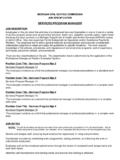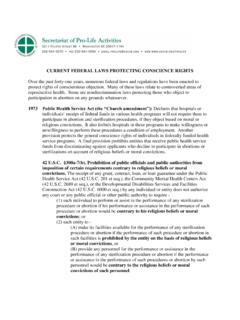Transcription of Code of Ethics - NYMHCA Homepage
1 code of Ethics AMHCA members follow the highest professional standards and pledge to abide by this code . code of Ethics of the American Mental Health Counselors Association 2000 Revision Preamble Mental health counselors believe in the dignity and worth of the individual. They are committed to increasing knowledge of human behavior and understanding of themselves and others. While pursuing these endeavors, they make every reasonable effort to protect the welfare of those who seek their services, or of any subject that may be the object of study. They use their skills only for purposes consistent with these values and do not knowingly permit their misuse by others.
2 While demanding for themselves freedom of inquiry and community, mental health counselors accept the responsibility this freedom confers: competence, objectivity in the application of skills, and concern for the best interest of clients, colleagues, and society in general. In the pursuit of these ideals, mental health counselors subscribe to the following principles: Principle 1 Welfare of the Consumer Principle 2 Clients' Rights Principle 3 Confidentiality Principle 4 Utilization of Assessment Techniques Principle 5 Pursuit of Research Activities Principle 6 Consulting Principle 7 Competence Principle 8 Professional Relationships Principle 9 Supervisee.
3 Student and Employee Relationships Principle 10 Moral and Legal Standards Principle 11 Professional Responsibility Principle 12 Private Practice Principle 13 Public Statements Principle 14 Internet On-Line counseling Principle 15 Resolution of Ethical Problems Clinical Issues Principle 1 Welfare of the Consumer A) Primary Responsibility 1. The primary responsibility of the mental health counselor is to respect the dignity and integrity of the client. Client growth and development are encouraged in ways that foster the client's interest and promote welfare.
4 2. Mental health counselors are aware of their influential position with respect to their clients, and avoid exploiting the trust and fostering dependency of their clients. 3. Mental health counselors fully inform consumers as to the purpose and nature of any evaluation, treatment, education or training procedure and they fully acknowledge that the consumer has the freedom of choice with regard to participation. B) counseling Plans Mental health counselors and their clients work jointly in devising integrated, individual counseling plans that offer reasonable promise of success and are consistent with the abilities and circumstances of the client.
5 Counselors and clients regularly review counseling plans to ensure their continued viability and effectiveness, respecting the client's freedom of choice. C) Freedom of Choice Mental health counselors offer clients the freedom to choose whether to enter into a counseling relationship and determine which professionals will provide the counseling . Restrictions that limit clients' choices are fully explained. D) Clients Served by Others 1. If a client is receiving services from another mental health professional or counselor, the mental health counselor secures consent from the client, informs that professional of the arrangement, and develops a clear agreement to avoid confusion and conflicts for the client.
6 2. Mental health counselors are aware of the intimacy and responsibilities inherent in the counseling relationship. They maintain respect for the client and avoid actions that seek to meet their personal needs at the expense of the client. Mental health counselors are aware of their own values, attitudes, beliefs and behaviors, and how these apply in a diverse society. They avoid imposing their values on the consumer. E) Diversity 1. Mental health counselors do not condone or engage in any discrimination based on age, color, culture, disability, ethnic group, gender, race, religion, sexual orientation, marital status or socioeconomic status.
7 2. Mental health counselors will actively attempt to understand the diverse cultural backgrounds of the clients with whom they work. This includes learning how the counselor's own cultural/ethical/racial/religious identity impacts his or her own values and beliefs about the counseling process. When there is a conflict between the client's goals, identity and/or values and those of the mental health counselor, a referral to an appropriate colleague must be arranged. F) Dual Relationships Mental health counselors are aware of their influential position with respect to their clients and avoid exploiting the trust and fostering dependency of the client.
8 1. Mental health counselors make every effort to avoid dual relationships with clients that could impair professional judgement or increase the risk of harm. Examples of such relationships may include, but are not limited to: familial, social, financial, business, or close personal relationships with the clients. 2. Mental health counselors do not accept as clients individuals with whom they are involved in an administrative, supervisory, and evaluative nature. When acting as supervisors, trainers, or employers, mental health counselors accord recipients informed choice, confidentiality and protection from physical and mental harm.
9 3. When a dual relationship cannot be avoided, counselors take appropriate professional precautions such as informed consent, consultation, supervision and documentation to ensure that judgement is not impaired and no exploitation has occurred. G) Sexual Relationships Sexual relationships with clients are strictly prohibited. Mental health counselors do not counsel persons with whom they have had a previous sexual relationship. H) Former Clients Counselors do not engage in sexual intimacies with former clients within a minimum of two years after terminating the counseling relationship.
10 The mental health counselor has the responsibility to examine and document thoroughly that such relations did not have an exploitative nature based on factors such as duration of counseling , amount of time since counseling , termination circumstances, the client's personal history and mental status, adverse impact on the client, and actions by the counselor suggesting a plan to initiate a sexual relationship with the client after termination. I) Multiple Clients When mental health counselors agree to provide counseling services to two or more persons who have a relationship (such as husband and wife, or parents and children), counselors clarify at the outset which person or persons are clients, and the nature of the relationship they will have with each involved person.







